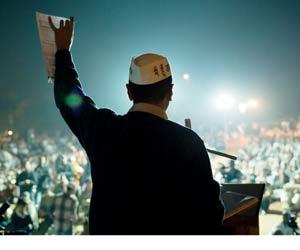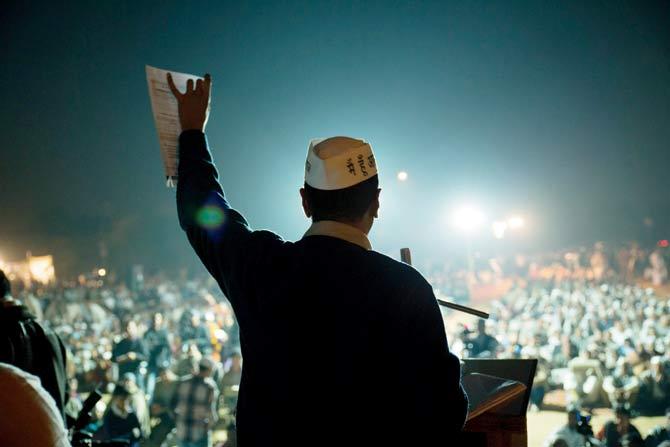Arvind Kejriwal doc, An Insignificant Man, which releases in theatres this Friday, is an essential document for posterity's sake

Arvind Kejriwal doc, An Insignificant Man, which releases in theatres this Friday, is an essential document for posterity's sake
ADVERTISEMENT
 In his book The Principles Of Representative Government, the NYU politics professor Bernard Menin draws a distinction between three facets of democracy - parliamentary, party, and audience.
In his book The Principles Of Representative Government, the NYU politics professor Bernard Menin draws a distinction between three facets of democracy - parliamentary, party, and audience.
Of these, he argues, 'audience democracy' is the most recent form. It robustly plays out in TV studios, social media (Facebook, Twitter, WhatsApp), through videos (doctored or not, even 'fake news', and conspiracy theories) - basically a mix of private gossip and public discourse - on the back of a personality cult that people inevitably rally around, round the clock, as vociferous supporters, or rabid critics.

Armed with a prying camera and unhinged access, Khushboo Ranka and Vinay Shukla do a splendid job of capturing early ruptures within AAP
While it's hard to find a better example of 'audience democracy' in action than the run-up to India's 2014 general elections, centred on (the present) Prime Minister Narendra Modi (and several state elections since), it might be fair to suggest that the phenomenon in its spontaneously purest form has got to be the Aam Aadmi Party (AAP).
It really started out with an audience surge in social media in 2011, around the serial agitator, activist Anna Hazare's anti-corruption rally, got picked up by national television, then swiftly developed into a middle-class movement, and finally a proper political party, with no ethnic allegiance, starring untested debutants, and with Anna's deputy Arvind Kejriwal foisted at the top of the rapid pyramid. There's obviously no precedence of this in modern Indian history.
Khushboo Ranka and Vinay Shukla's neatly edited, thoroughly entertaining documentary An Insignificant Man, produced by Anand Gandhi, backed by several prestigious global film grants, besides crowd-sourced funding - audiences are even encouraged to host its screenings in PVR theatres near them - at its origin, seems quite similar to AAP itself, whose rise in Delhi they effectively chronicle.
What is so significant about this film, besides its subject? That it looks closely at the idea of democracy that, if you observe without burdening yourself with idealism, is essentially, unsurprisingly a sham - as much in our professional lives as in politics, which for the most part is also a profession, set around an organisation, with a leader (or boss) who leads, and whose writ runs (in both the party, and the parliament/legislature, if you make it there).
Did AAP, gathering newbies from nukkads and posh neighbourhoods, aim to change that? Hell yeah, don't we all? The natural conflict that emerges as a result is what the film probes. For, at the end of the day, utopian intents rarely answer the most fundamental question driving most human engagements: "What's in it for me?"
This partisan politics, of course, is quite different from politics per se that, at its core, could basically be a response to injustices of any kind, whether inflicted on self, or others. And you can be political, while remaining an artiste, banker, dhobi, whatever. Kejriwal, as you can tell, was one of the most fearless, independent journalists around. He would regularly fish out documents and signed papers to take on bigwigs in business and government, much to the applause of the public, who often suffer because of collusion between both.
"Don't hunt what you can't kill." "Revolutionaries are fine for flings. They don't make for good husbands." These are some of the cynical refrains you hear from mainstream political parties in response to Kejriwal's reporting of facts. Mainstream news media seem like lame, gossip-mongering jokers in comparison. But it's one thing to stand up against something/someone. Perhaps quite another to stand for something - managing multiple interests, differing viewpoints, and realpolitik in the process.
Armed with a prying camera and unhinged access, Ranka and Shukla do a splendid job of capturing early ruptures within AAP. Political analyst Yogendra Yadav, Kejriwal's think-tank, makes a fine point in the film about balancing "shubh" with "sach", or final goal, with ground reality - the latter never making the 'movement' lose sight of the former. Yadav was eventually kicked out of AAP, for "anti-party activities".
Gauging public opinion before the 2014 battle between Modi and Kejriwal in Varanasi's parliamentary elections, it was easy to tell Modi would win. He was the 'lahu purush' or 'strongman'. Kejriwal was the 'bhagoda'. It seemed like collective opinion. He'd dissolved his 2013 minority government in Delhi over the anti-corruption bill not being turned into law. A liquor store-owner in the temple town told me instead, "Just look at Kejriwal's sacrifice. Which 'mai ka lal' (son of a gun) gives up power over principles in this frickin' country?"
Maybe that's the perception that led AAP to deliver a historic win in the 2015 state elections in Delhi, besides that the party had carefully distilled their vague ideals into urgent, twin issues for the common voter -water, and electricity.
Kejriwal was anointed king, only extending the personality cult that's progressively defining politics in an 'audience democracy'. This is probably irresistible now, if not wholly irreversible. Never mind the original intent. It's like the star-driven movies, man. That's also why An Insignificant Man is as good as mainstream, big screen entertainment!
Mayank Shekhar attempts to make sense of mass culture. He tweets @mayankw14. Send your feedback to mailbag@mid-day.com
 Subscribe today by clicking the link and stay updated with the latest news!" Click here!
Subscribe today by clicking the link and stay updated with the latest news!" Click here!






